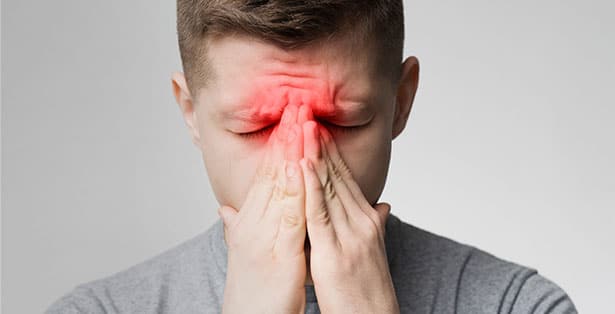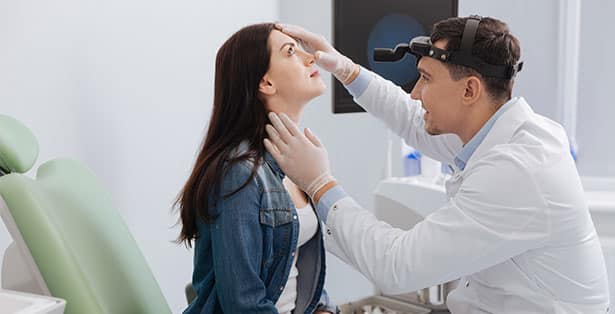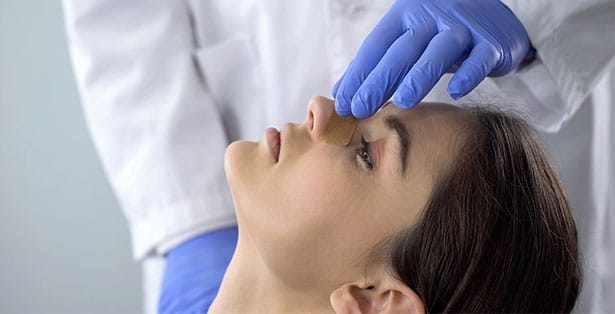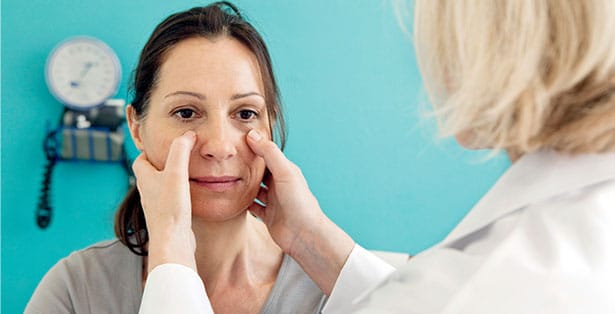
Nasal Airway Obstruction
If difficulty breathing through your nose is not responding to medications, there is likely a structural issue that is the underlying problem – often a deviated septum or enlargement of nasal turbinates.

Deviated Septum
The wall between your nasal passages is called the septum. When it is displaced to one side rather than centered, it is referred to as a deviated septum. When one nasal passage is narrowed, it can result in difficulty breathing through the nose. This deviation may cause additional problems, including nosebleeds, headaches, ear infections, snoring, and sinus infections.
When treatments, such as decongestants or antihistamines don’t relieve nasal obstruction, you may need surgery – septoplasty.
Surgical straightening of the nasal septum is performed while the patient is asleep under general anesthesia. Although your septum is repositioned to correct this problem, it won’t cure other issues with sinuses or allergies.

Turbinate Hypertrophy
Nasal turbinates are normal structures within the nose – there are three turbinates on each lateral wall. They are thin bones shaped like scrolls and are covered by tissue with a rich blood supply. The tissue adjusts its thickness under varying atmospheric conditions to warm air, moisten it, and filter it.
In response to untreated allergies and chronic inflammation, they may enlarge in size and can contribute to the problems by decreasing nasal airspace. This results in the sensation that you can’t breathe through your nose.
When medical management does not resolve the nasal obstruction, surgery may be necessary. Often a septoplasty is combined with an inferior turbinate reduction.

Nasal Valve Collapse
Occasionally, the sidewalls near the tip of the nose may collapse with breathing, preventing air from getting into the nose in the first place. Patients often complain they can’t breathe through their nose. This is often a structural issue that requires surgical intervention.

Sinus Infections
Sinus infections can be painful and affect your ability to properly breathe. Symptoms we can help with include:
- Pressure in the face
- Colored nasal drainage
- Can’t breathe through nose
- Head feels plugged

What Are Sinus Infections?
Sinusitis is common and affects millions of people each year. It is an inflammation of the tissue lining of the paranasal sinuses and results in symptoms of colored nasal discharge and congestion, pressure in face and cheeks, pain between the eyes or forehead, fever, headache, and sometimes dental pain and pressure in the upper teeth.
Sinusitis usually starts with a common viral cold that then becomes a sinus infection. Other factors such as allergies and environmental irritants can play a role, and occasionally nasal polyps can be an underlying issue.
There are three types of sinusitis:
- Acute Sinusitis – lasting less than 10 days
- Chronic Sinusitis – lasting greater than 3 months
- Recurrent Sinusitis – four or more acute episodes per year
Treatment for Sinusitis
Treatment includes medicated nasal sprays, antibiotics, irrigation of the sinuses, and management of underlying issues such as allergies or nasal polyps. In some cases, sinus surgery is an appropriate option to remove diseased tissue and enlarge the sinus openings.
Nasal Polyps
Nasal polyps are the most common growths found within the nose. They are soft, noncancerous, and protrude from the lining of the nose or sinuses. They can be very troublesome, as they tend to make breathing difficult and often decrease or diminish the sense of smell. Nasal polyps are painless and people often don’t know they are present.
Treatment ranges from medication to surgery and polyps often recur over variable lengths of time.

Frequently Asked Questions
Can a deviated septum cause sleep apnea?
While a deviated septum does not cause sleep apnea, it can exacerbate your symptoms. A common indicator of sleep apnea is snoring, which can be worsened by a deviated septum as you may experience difficulty breathing. A deviated septum and sleep apnea can both be diagnosed and treated by Dr. Said Sana.
What is the purpose of sinuses and turbinates?
The sinuses are hollow areas in the skull occupying the space above, between, and below the eyes. The function of the turbinates is to warm and humidify the air you breathe before it leaves your lungs.
Can enlarged turbinates cause ear problems?
Yes, turbinate swelling is often associated with eustachian tube dysfunction. This often results in ear pain, fullness in the ears, and reduced hearing.
